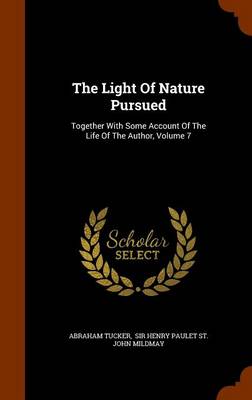Abraham Tucker (1705-74) was an important but somewhat eccentric British philosopher who wrote in a highly individual style. He lived at Bletchworth Castle in Surrey, managing his estates, reading philosophy and writing various works under the pen-names Cuthbert Comment and Edward Search. Tucker lost his eyesight in middle-age but continued to compose his long masterpiece "The Light of Nature Pursued", using a writing machine that he had designed himself. Tucker was a follower of the great empiricist John Locke, believing that the mind begins as a blank slate on which all knowledge is written by experience alone. "The Light of Nature Pursued" is particularly interesting as a development of Locke's metaphysics and philosophy of mind. In his moral philosophy Tucker was among the early utilitarians, arguing that the motive for all our actions is the pursuit of our own satisfaction and that the maximization of everybody's satisfaction is the ultimate moral good. Among those most influenced by his work were William Paley and William Hazlitt. This text was first published posthumously in seven volumes in 1777, and is nowadays rare in any edition.
This republication of the fifth edition of 1840 (which includes a short biography of Tucker) with a new introduction by James A. Harris should be of substantial interest to many scholars in 18th- and 19th-century studies.
- ISBN10 1344717543
- ISBN13 9781344717540
- Publish Date 16 October 2015 (first published 15 November 2002)
- Publish Status Unknown
- Imprint Arkose Press
- Format Hardcover
- Pages 704
- Language English
